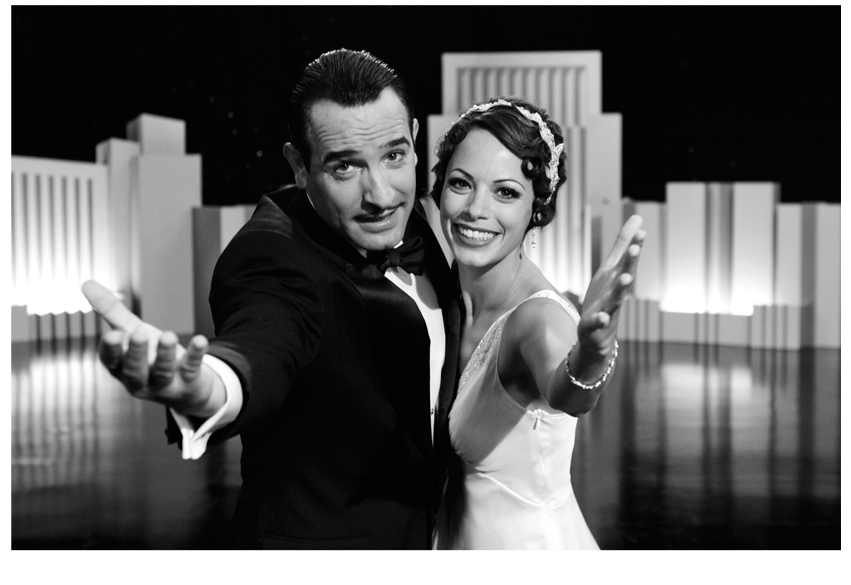Every so often a film comes from the left field and plays a complete blinder and The Artist is such a film. It is also glorious, delicious and an unalloyed joy and if you don’t go see it you are a bigger fool than I thought you were, which is going some. It’s a film about silent films but not just a film about silent films because this is a silent film about silent films, and so beguiling and touching and funny and tender and clever without being cute it’ll warm the cockles of your heart. I loved it, adored it, delighted in every frame of it, would run off with it, if I could — right now, today — and as my cockles now say, ‘Thank you. We are warm. It’s nice.’
Written and directed by Michael Hazanavicius, this is a French film but set in Hollywood in the late 1920s. Its story is familiar, a sort of mash-up of A Star Is Born and Sunset Boulevard and Singin’ in the Rain, but I’m supposing this is wholly intentional. This is a movie about Hollywood movies which is constructed from old Hollywood movies about Hollywood, and movies. Neat. Smart. I would shake Mr Hazanavicius’s hand, if he ever asked me over for pie.
This is the movie Scorsese could have made if he hadn’t been so hung up on clocks and whatnot and dull little Hugo bleating about automatons. Our hero here is not dull. Our hero is George Valentin (Jean Dujardin), a suave, dashing, preening silent film star adored by his fans. He has shiny hair, a thin moustache, sparkling teeth and lives in a Beverly Hills mansion with his devoted dog and a wife (Penelope Ann Miller) who is rather less devoted, and likes to quietly deface his photograph whenever it appears in Variety. But she is the least of his troubles.
The talkies come along, which transform Valentin into yesterday’s man, while elevating a perky little starlet called Peppy Miller (Bérénice Bejo). His wife leaves him. The studio boss (a wonderfully playful John Goodman) no longer has any use for him. He refuses to change and pours all his money into making a silent film, which bombs. He sinks into depression and alcoholism, and is left only with his loyal chauffeur (James Cromwell) and his trusty little dog, a Parsons Jack Russell, who is the best dog in a movie ever, and won the ‘Palm Dog’ at Cannes. Valentin had enjoyed a flirtation with Peppy when he was a star and she was an extra. He provided her with a gimmick: a beauty spot which he tenderly pencilled in for her. Will she stay loyal, too? Might he be too proud to accept her help anyhow?
This is a lovely ride, and an exciting one, blending just the right amounts of realistic acting and melodramatic exaggeration. Dujardin, in particular, is extraordinarily nimble; hammy when he is playing ham, but subtle otherwise, and you can’t not adore him. You just can’t. It would be impossible. There is no spoken dialogue — apart from one clever, telling little line at the end — just intertitles, and it’s all accompanied by a boisterous, breathless musical score. It is homage, but it’s not the sort of film-geeky homage that puts you to sleep (almost instantly in my case; also, see Hugo).
Valentin is every silent film smoothie that there has ever been (although Douglas Fairbanks Jnr is the one that first springs to mind) and there’s a Citizen Kane-style breakfast scene and such like. But this is never pastiche or, if it is, I didn’t notice. Our affection for the characters is such that we truly, truly, truly care what happens to them — and the humour is sublime. There are old-style sight gags involving comedy cops but also a dream sequence — Valentin has a nightmare to do with sound — that is as marvellously funny as it is inventive. This film plays a complete blinder, like I said, and I loved it. Loved it, loved it, loved it, loved it, loved it, loved it, loved it. Go see it, and this recommendation is my New Year’s gift to you. There is nothing else, not even a last-minute voucher. Sorry.






Comments